|
|
Update, June 20 at 1:00 p.m. – The House passed its budget 68-36 on Thursday with bipartisan support.
After publication of this article, the Senate released a 46-page budget bill on Wednesday titled, “Adjustments to the 2023 Appropriations Act.”
Now, the Senate and House must work together to pass a compromise budget.
The Republican-led House dropped its updated budget proposal for Fiscal Year (FY) 2024-25 on Monday night, calling for the restoration of master’s pay for teachers, an increase in beginning teacher pay, and “full funding” for private school vouchers through the Opportunity Scholarship program, among other things.
In a press release, House Speaker Rep. Tim Moore, R-Cleveland, said the House budget “prioritizes investments in school choice, salaries, (and) childcare.” The proposal includes $135 million for child care stabilization grants.
“The House budget fully funds Opportunity Scholarships for the thousands of North Carolina families who have applied to the scholarship program. Parents must be empowered to make the best education choices for their families regardless of income status, but school choice is not a zero-sum game,” Moore said. “Therefore, the House budget also raises starting teacher pay to $44,000 and restores masters pay for teachers, ensuring every public school classroom has a qualified teacher who is compensated like the professional that he or she is.”
Sign up for the EdDaily to start each weekday with the top education news.
Last long session, state lawmakers passed a biennial budget that allocated nearly $17.9 billion to education in FY 2024-25. The House proposal released on Monday increases that amount to more than $18.5 billion. Under the proposal, about $12.1 billion is allocated to the state Department of Public Instruction (DPI), which is responsible for the bulk of K-12 education items.
This year’s short session started on April 24. During this session, lawmakers can adjust the two-year budget passed in the long session and are able to discuss bills that previously passed one house, or recommendations from a study commission.
North Carolina has a projected one-time $987 million surplus in state revenues through Fiscal Year (FY) 2025, according to a revised forecast released in May. These are extra state dollars that lawmakers can choose to invest this short session.
There is a Republican supermajority this session, meaning Republicans will drive fiscal and policy decisions. However, Senate President Pro Tempore Phil Berger, R-Guilford, has said the House wants to spend too much money, and that North Carolina already has an enacted budget for FY 2024-25.
The Senate and House must work together to pass an updated budget. If the General Assembly does not pass an updated budget, the biennial budget enacted in 2023 will stand.
Below, you can find analysis of the major education items in the House budget proposal, along with how those compare to the current biennium budget.
See the money report for the House proposal here. See the bill text for the proposal here.
Read more
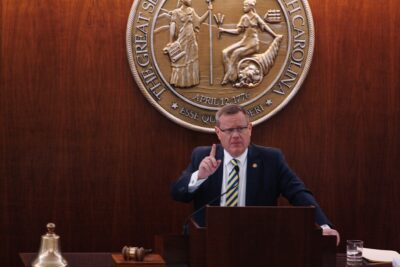
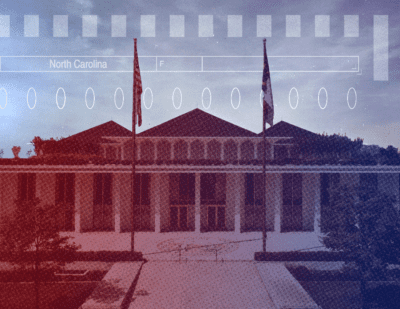
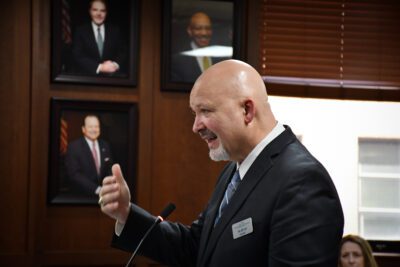
Pay for teachers, school employees
The House budget proposal allocates nearly $100 million recurring to increase the base teacher salary schedule, which would increase starting teacher pay to $44,000.
Including step increases, the budget says the average teacher raise in FY 2024-25 is 4.4%. That increase includes the 3% increase for FY 2024-25 that was approved in the 2023 budget.
You can view the proposed salary schedule below.
The proposal also includes $8 million in recurring funds to restore master’s pay for teachers, which includes a 10% monthly supplement. This initiative was funded in North Carolina until 2013.
This is not the first time the House has tried to restore master’s pay. It was included in last year’s House proposal, but it did not make it into the Senate proposal or compromise budget.
For other school employees, the budget provides funding for an additional 1% across-the-board salary increase for principals, non-certified staff, and DPI employees. This increase is in addition to the 3% raise passed in the 2023 budget, meaning the proposal calls for a 4% raise.
You can find the proposed salary schedule for principals on page 89 of the bill text.
There is also $21 million “to support non-instructional support personnel. The revised total requirements for this allotment, including technical adjustments, are $529.0 million in FY 2024-25.”
The House proposal also includes a one-time, cost-of-living supplement of 2% in FY 2024-25 to state retirees, using receipt funds.
Finally, the budget also includes additional supplement funding:
- $11 million recurring to increase all tiers of the Small County supplemental funding allotment. The total requirements of this allotment, including technical adjustments, are $70.4 million in FY 2024-25.
- $10 million for the supplemental funding in low-wealth counties. The total requirements of this allotment, including technical adjustments, are $339.7 million in FY 2024-25.
Private school vouchers
The 2023 budget added $250 million to the Opportunity Scholarship Grant Reserve, putting the revised appropriation for the reserve at $618 million for the biennium.
The 2023 budget also removed all income eligibility requirements for recipients starting with the 2024-25 school year. However, a waitlist this year meant that many higher-income students would not access the grant funds. An April press release from Berger said “it is estimated that more than 54,800 applicants are on the waitlist.”
In May, the Senate passed a bill that would eliminate the waitlist for Opportunity Scholarships, allocating roughly an additional $463 million to the program over the next two years.
The House budget proposal includes that increase for this fiscal year, allocating an additional $248 million in nonrecurring funds. This includes $151 million of allocations and $97 million in receipts from N.C. Education Lottery receipts.
“The revised amount allocated for awards in FY 2024-25 is $541.5 million,” the budget money report text says.
The House proposal would also provide $215 million additional funds to the Opportunity Scholarship Grant Fund Reserve to increase the number of Opportunity Scholarship awards available beginning next year, in FY 2025-26.
“Funding provided for this purpose is intended to help avoid future waitlists for the program,” the money report says. “The revised net appropriation to the Reserve is $570.0 million in FY 2024-25.”
The proposal would also allocate an additional $24.6 million to the Personal Education Student Accounts for Children with Disabilities (PESA) Program “due to an increase in eligible applicants.” With those funds, the revised net appropriation is $74.5 million in FY 2024-25.
According to NCSEAA, “North Carolina’s Education Student Accounts (ESA+) program is available to meet the needs of students with disabilities. Funds may be used to pay tuition and fees for eligible private schools, and for expenses such as speech therapy, tutoring services, and educational technology.”
In 2022-23, according to data on the NCSEAA website, 3,377 students had ESA+ Scholarships.
Last spring, NCSEAA sent award offers to the families of 958 new students. EdNC previously reported that there are an estimated 2,015 applicants currently on the waitlist.
Other K-12 items
The House proposal decreases Average Daily Membership (ADM) funds by $193 million, to fund an allotted ADM of 1,522,322 students in FY 2024-25. According to the budget, “the shift to an arrears model results in a budgeted decline of 27,506 students.”
The proposed budget also includes $95 million to the ADM Contingency Reserve “to fund growing public school units (PSUs).”
The 2023 state budget directed DPI to develop a funding in arrears model, which means public school funding would be based on the actual ADM from the prior school year, instead of projections for the upcoming school year.
DPI is set to start distributing funding in arrears starting with the 2024-25 school year.
“Due to the shift in public school funding to arrears, the size of this reserve is increased to provide funds to schools experiencing growth in membership from the prior year,” the budget says. “The revised net appropriation for this purpose is $97.8 million in FY 2024-25.”
There is also nearly $67 million for a “special population headcount adjustment.” According to the budget, this “adjusts funding budgeted for the Exceptional Children (EC) preschool and school-age allotments, as well as the Limited English Proficient (LEP) allotment, to reflect actual student headcount.”
The bill text also includes language from House Bill 1035, Support Students With Disabilities Act, which was filed with bipartisan support:
The creation of a grant program for local school administrative units to apply for funds to cover extraordinary costs of children with disabilities. The Department of Public Instruction shall consult with the Department of Health and Human Services, Division of Health Benefits, on opportunity for Medicaid reimbursement for services provided to students with disabilities in Approved Schools and the impact of Medicaid reimbursement on the cost of student placements in Approved Schools. Reported recommendations on this grant program shall include at least the following:
Excerpt from the House proposal’s bill text
a. Costs associated with placement in Approved Schools in accordance with a student’s IEP.
b. Potential sources of funding for the grant program.
c. Methods of oversight to be used by the Department during administration of the grant program.
The budget also provides $50 million, funded through receipts, for repairs and renovations of K-12 educational facilities. The revised total requirements for this fund are $100 million in FY 2024-25, the budget says, and each county will receive an allocation of $1 million.
Finally, the budget transfers the Center for Safer Schools and the Task Force for Safer Schools from DPI to the State Bureau of Investigation (SBI). Under the proposal, the director of the center would now report to the SBI director, instead of the state superintendent.
Curriculum and career development
The budget proposal lays out a process for “challenges to supplementary and instructional materials,” which you can read starting on page 55 of the bill text.
That process would require local boards of education to establish a community media advisory committee to “investigate and evaluate challenges to supplementary and instructional materials.” Challenges must be made in writing and specify that the material is obscene, inappropriate to the age, maturity, or grade level of the students, and/or not aligned with the standard course of study.
“The local board, at all times, has sole authority and discretion to determine whether a challenge has merit and whether challenged material should be retained or removed. The decision of the board is not appealable,” the bill text says.
The budget proposal includes $9 million toward the Excellent Public Schools Act, which includes funding for K-3 literacy efforts. The budget says this amount “restores funding to the Excellent Public Schools Act that was erroneously reduced in the technical adjustments contained in S.L. 2023-134.”
For math instruction, the budget includes $900,000 in recurring funds for schools participating in the Math That Counts pilot program. Per the budget, the funds should go toward purchasing screening assessments for fourth- and fifth-grade students. The pilot would start during the 2024-25 school year and use the program’s i-Ready assessment and Zearn Math learning platforms.
According to the budget, the Golden LEAF Foundation would provide $7.9 million in funding to “local boards of education identified by the Superintendent of Public Instruction… to contract with Zearn for use of the Zearn Math learning platform and intensive support.”
“The goal of the State is to ensure that every student meets or exceeds expected mathematics learning by the end of fifth grade and continues to progress so that he or she can have the understanding and skills needed for secondary education and career success,” the budget bill text says.
There is also $250,000 in additional funds for DPI to contract with International MIND Education Institute, Inc. for their math program to improve math proficiency for students. The revised net appropriation for this purpose is $550,000 in FY 2024-25.
The 2023 budget directed the State Board of Education to develop standards for a new career pathways course in middle school. That course will help meet another new requirement, which requires seventh graders to develop career development plans in order to move to the next grade level. In 10th grade, students must revise that plan to move to the next grade.
The budget directed the Board to pick at least 20 local school administrative units to pilot the career development plan requirements during the 2023-24 year. The state will implement the full plan in 2024-25.
The House’s proposal provides $10.6 million to hire a career and technical education (CTE) coordinator for each district to “support students in grades 6 and 7 prior to the creation of their career development plans.”
“Local boards of education are encouraged to hire full-time, permanent CTE coordinators with these funds, but the funds may be used for other methods of support if the local board of education determines that adequate information and support is being provided without hiring a full-time, permanent CTE coordinator,” the budget proposal bill text says.
The budget also adds $2.9 million to the Sixth and Seventh Grade CTE Expansion Grant Program, which awards competitive grants to school districts over a seven-year grant period to expand CTE programs to middle schoolers. The revised net appropriation for this program is $4.1 million in FY 2024-25.
There is also $475,000 in recurring funds for DPI to contract with Year13, Inc. for use of their student career planning tool.
Finally, the proposal includes “a directed grant of $2.2 million to the Society of Manufacturing Engineers (SME) Education Foundation for their Partnership Response In Manufacturing Education (PRIME) program, which provides funds for schools and manufacturing partners to create a laboratory at the school where students can earn credentials that are specific to the manufacturing partner’s needs.”
Charter schools
State law previously gave the State Board of Education sole authority of charter school oversight in the state, including the approval and renewal of charters. The Charter Schools Advisory Board assisted the Board by providing recommendations. That advisory board was assisted by the Office of Charter Schools.
Given a law enacted last August, the former Charter School Advisory Board no longer exists. Instead, the newly established Charter School Review Board (CSRB) has authority to approve charter applications, renewals, and material changes.
“This action will make the application process more efficient, more cost-effective, and much more streamlined for all stakeholders involved,” Rep. Tricia Cotham, R-Mecklenburg, said at the time.
The House proposal’s bill text includes multiple rules to “clarify” the role of the CSRB.
First, the bill text clarifies that any rule adopted by the State Board of Education regarding charter schools “shall first be approved and recommended by the Charter Schools Review Board.”
The proposal shifts the supervision of the North Carolina Office of Charter Schools’ executive director to the CSRB. Currently, the director reports to the state superintendent.
This comes after the State Board of Education has been working to update its policy on charter renewals. In April, the Board approved its updated charter renewal policy, which you can read here. And earlier this month, the Board approved the 2024 Revised Charter Agreement, which charters must sign.
The House budget would also allow charter schools to open a satellite campus without prior approval from the CSRB, “so long as the expansion or satellite location is within a 10-mile radius of the school’s main location.”
The budget also provides for expedited openings of one qualifying charter school. According to a report by WFAE’s Ann Doss Helms, that school is Trinitas Academy, which has multiple political connections. Susan Tillis, wife of Republican U.S. Senator Thom Tillis and founder of the Susan M. Tillis Foundation, was one member of the classical academy’s board.
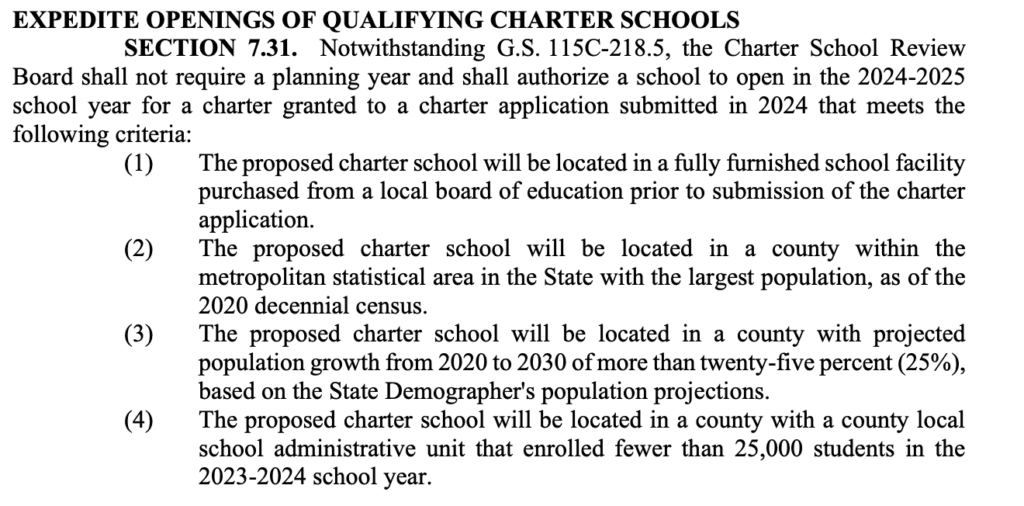
You can read all the rules starting on page 80 of the bill text.
Finally, the budget allocates $500,000 in additional funds for the Charter School Transportation Grant Program. The revised net appropriation for this purpose is $3 million in FY 2024-25.
Cooperative Innovative High Schools
The proposal provides supplemental funding of $475,000 for two new Cooperative Innovative High Schools (CIHS), which were both approved by the State Board of Education earlier this year — Dare Early College High School and Rockingham County CTE Innovation High School. The revised net appropriation for this program is $29.7 million in FY 2024-25.
The budget also includes $2 million in additional funds to cover the costs associated with tuition payments for Cooperative Innovative High Schools that are affiliated with a university partner. The revised net appropriation is $4.4 million in FY 2024-25.
Items we will be asking questions about
Starting on page 48 of the bill text, the proposal lays out a process to create a “program to allow financial ad hiring flexibility plans for certain school districts.”
Prior to the 2025-2026 school year, an eligible district (District) may submit a Financial and Hiring Flexibility Plan (FHFP) to the State Board of Education (State Board) to permit the local board of education (local board) to decide certain matters related to the operation of the schools under the local board’s control within the District, including the use of State funds, as provided in this section. The purpose of operating a District under a FHFP shall be for the local board to design and create a comprehensive, innovative, strategic vision allowing additional flexibility to the District to provide a high-quality education to all students.
Excerpt from budget proposal bill text.
According to the proposal, eligible districts must:
- Have the authority to levy and lay special taxes for the payment of bonds issued by the governing body of the unit.
- Have an allotted average daily membership of at least 5,000 for the 2023-2024 school year.
How many districts would actually be eligible under this criteria? What would the impact of this program actually be, and how would it differ from current flexibility models such as Restart? EdNC will be looking into FHFPs, especially if this provision makes it into an updated budget.
Page 51 of the bill text lays out statutory changes for DPI funding in arrears, which was mandated in the 2023 budget. Stay tuned for more on the implications of the move to the funding in arrears model.
Page 67 of the bill text outlines a plan to establish the Northeast Regional School of Biotechnology and Agriscience, “as a school of choice that will expand student opportunities for educational success through high quality instructional programming in the northeastern region of the State.” According to the budget, the school would serve seventh-12th grade students.
Finally, on page 86 of the bill text, the proposal directs the State Board of Education to “adopt a program to facilitate the process by which teacher assistants may become teachers.”
According to the proposal, teacher assistants would be eligible to participate in the program is they are enrolled in a recognized Education Preparation Program (EPP) and employed in a public school unit.
Grants and other items
- $1.7 million nonrecurring for a competitive grant program for districts to “provide suicide prevention training for teachers and staff.”
- $1 million nonrecurring for a competitive grant for districts to buy classroom agricultural technology for agricultural education.
- $517,495 to continue the afterschool robotics grant program, which allows schools to apply for funds to develop competitive afterschool robotics programs with a robotics partner.
- $700,000 additional funding to DPI for Governor’s School, “a program that supports summer enrichment activities for talented high school students.” The revised net appropriation for Governor’s School is $1.5 million in FY 2024-25.
Community colleges
The House proposal’s bill text directs the State Board of Community Colleges to “revise its funding formula for community colleges and allocate funds under that revised formula, beginning with the 2024-2025 fiscal year.”
This short session, the N.C. Community College System’s (NCCCS) primary legislative request is money for Propel NC, the system’s new funding model proposal. The request includes a nearly $100 million price tag for FY 2024-25.
The system’s current funding model allocates resources to the colleges in proportion to the number of full-time equivalent (FTE) students they enroll in each of their programs. Certain courses receive more state funds than others based on a four-tier funding model.
Propel NC would shift the current FTE funding tiers to “workforce sectors,” with courses ranked and valued by statewide salary job demand data every three years. All curriculum and continuing education (CE) courses would reside in the same workforce sector. The NCCCS says this shift “prioritizes connecting students to high-demand, high-wage jobs.”
The anticipated cost of this component of the model is approximately $68.6 million, according to the system.
Read more
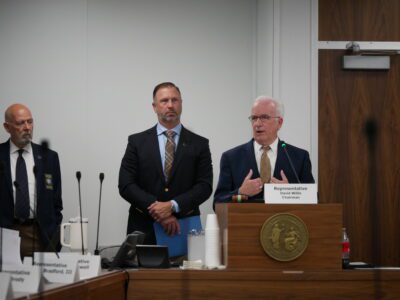


Neither the House money report nor bill text include the phrase, “Propel NC,” but both address the request.
The money report includes $18.5 million in recurring funds for “funding model workforce parity.”
The budget says this item provides “additional funds for short-term workforce courses to create funding parity between Workforce Continuing Education (WCE) and Curriculum programs. Funds provided for this purpose shall be used to increase the budget FTE formula values for applicable WCE programs in the revised funding model.”
The bill text says FTE funding for courses will be “weighted based on the workforce sector of each course, as determined by the State Board.”
The budget does not include funds to increase base funding, which is also part of the Propel NC request.
However, it does include $6 million in nonrecurring funds “to establish an enrollment increase reserve for community colleges with eligible enrollment increases that exceed budgeted enrollment levels. NCCCS will submit an annual request to replenish the reserve via the enrollment growth adjustment as needed.”
On years when the system as a whole generates excess receipts, the proposal would also allow excess tuition receipts to return to the college which generated them.
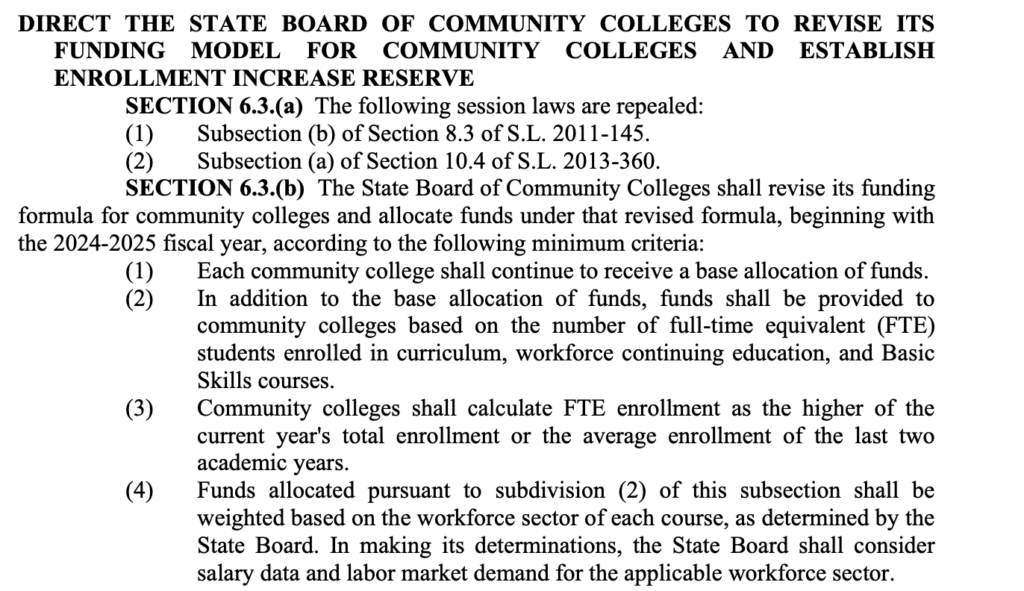
The budget proposal also includes funding for an additional 1% across-the-board salary increase for community college and NCCCS employees. This would be in addition to the 3% raise already approved for FY 2024-25, for a 4% total raise.
Community college retirees in the state’s retirement system will also receive a 2% cost-of-living supplement in FY 2024-25.
The proposal also includes $83.7 million (including receipts) to the NCCCS based on enrollment changes, which “increased by 13,770 full-time equivalent (FTE) students, or 6.1%, compared to the amount budgeted for FY 2023-24.”
The budget also includes several items related to the workforce.
There is $4 million additional in recurring funds to the Short-Term Workforce Development Grant Program, bringing the revised net appropriation in FY 2024-25 to $5 million.
That program provides grants up to $750 for resident students who enroll in noncredit, short-term workforce training programs that lead to an industry credential in fields with employer demand and competitive wages.
The proposal also appropriates $2 million in nonrecurring funds “for a year of preparation and planning to implement programs at community colleges that serve students between the ages of 16 and 24 with intellectual and developmental disabilities (IDD).” According to the budget, these funds should be used to “build capacity to provide services to students with IDD participating in the Career and College Promise Program.”
The budget also includes funds for the NCCCS’ Enterprise Resource Planning (ERP) modernization efforts. There is nearly $18 million in nonrecurring funds, funded through receipts, to upgrade ERP systems at individual colleges.
There is also $750,000 in nonrecurring funds for the NCCCS “to provide grants to cover up to 50% of the cost incurred by any community college that contracts to use a learning management system that is also utilized by the majority of K-12 students in the college’s service area.”
Finally, under the UNC System, the budget proposal also allocates $1 million nonrecurring to the North Carolina State Education Assistance Authority (SEAA) for outreach efforts to increase completion rates of the Free Application for Federal Student Aid (FAFSA).
This comes as delays and technical glitches for the new FAFSA have led to lower completion rates in North Carolina and across the nation.
Sign up for Awake58, our newsletter on all things community college.
Early education and child care
This short session, child care advocates are asking state legislators for a one-time $300 million allocation to avoid closures and price increases for parents. Federal funds stabilizing child care run out at the end of June.
As EdNC previously reported: Advocacy organizations, the legislative early childhood caucus, and business groups asked the General Assembly for the same amount last year without success.
“The emergency that we’ve been talking about is here,” said Erin Carson, director of the National Domestic Workers Alliance (NDWA) state chapter. “There’s no more kicking the can down the road or talking about other funding sources.”
The House plan includes a one-time $135 million allocation to extend stabilization grants to child care programs as federal funds expire at the end of this month.
Without additional support, the end of that funding is expected to lead to the closure of as many as 30% of programs and increased prices for parents. The proposal’s amount would cover another year’s worth of grants to programs at 75% of what programs are receiving, according to legislators.
The proposal also includes a one-time $1 million to expand the state’s Tri-Share pilot, which splits the cost of child care between participating businesses, eligible employees, and the state government. The pilot, created in last year’s budget, launched this summer in 3 regions, covering 14 counties. The House budget proposal would expand the program to three more sites.
The budget would also change how the state distributes subsidy funding to help low-income working parents afford child care. It would no longer include a program’s quality based on state standards as a factor in determining how much programs receive through the subsidy program.
Read the article below for EdNC’s deep dive on the budget proposal’s child care components.
Behind the Story
The early child care section of this article includes reporting from EdNC reporter Liz Bell.
Recommended reading




